Description
Black Turmeric, Curcuma caesia, is a potent perennial medicinal herb. This plant and its amazing blue-green colored rhizomes have an agreeable odor, but intense flavor, somewhat reminiscent of turpentine. Black turmeric goes dormant during part of the year, reverting to underground storage rhizomes to wait out the winter. Mid-spring, the plant shoots up bright pink and yellow flowers, and leaves up to four feet tall, bearing a red stripe along the midrib, follow a few weeks later. Common medicinal applications include use as an anti-inflammatory, anti-fungal, anti-asthmatic, antioxidant booster that can also soothe gastric issues, relax muscles, ease joint pain, control bleeding, and speed up healing of cuts and wounds. Pretty much a cure all!
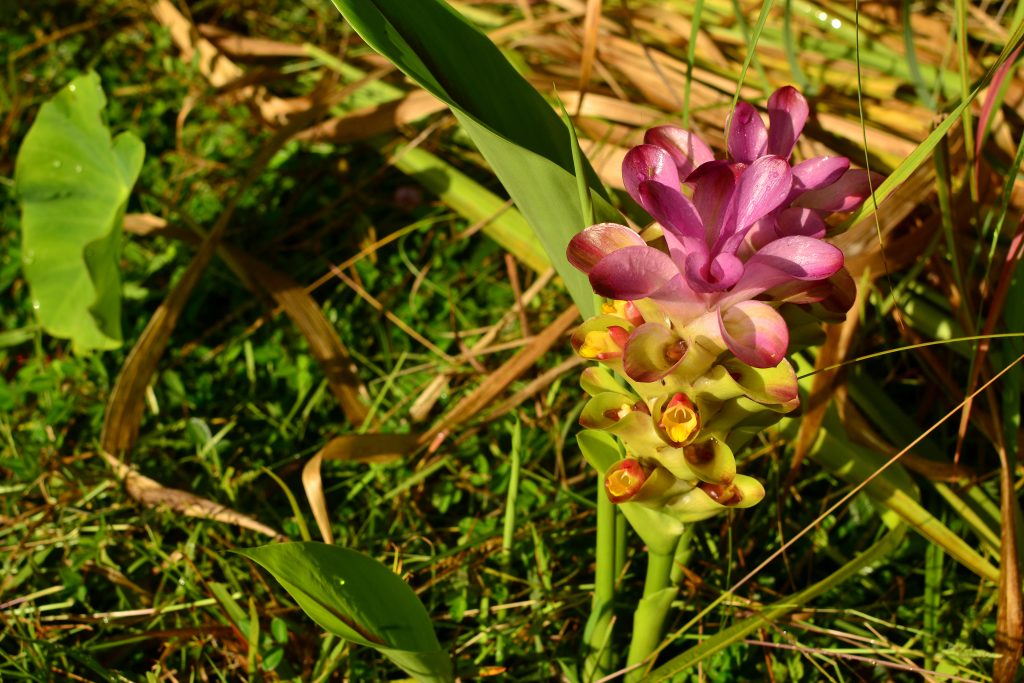
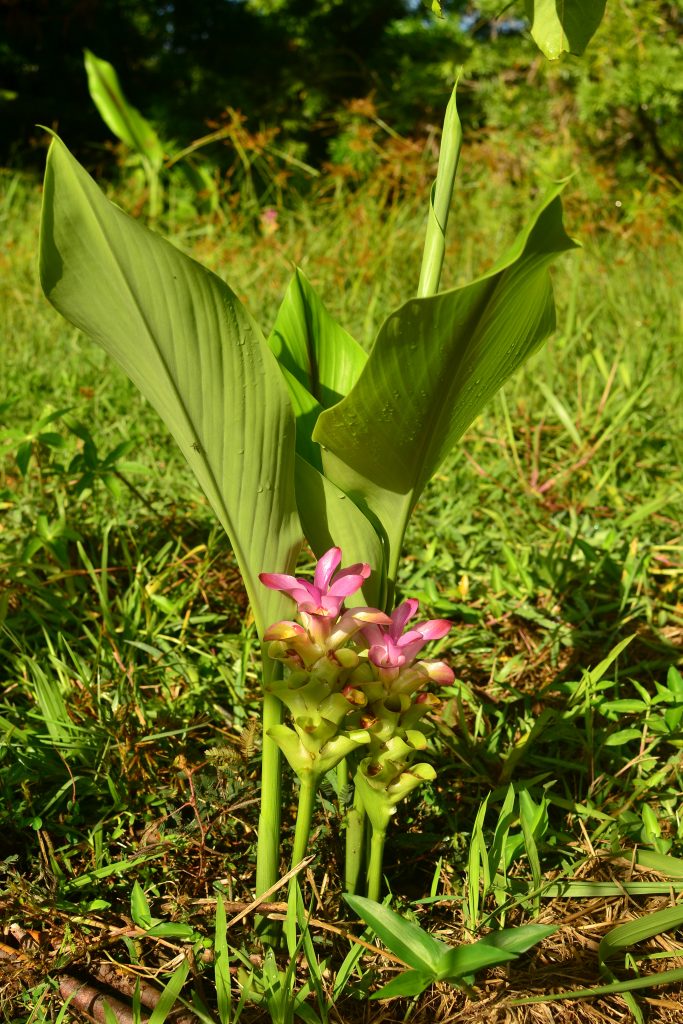
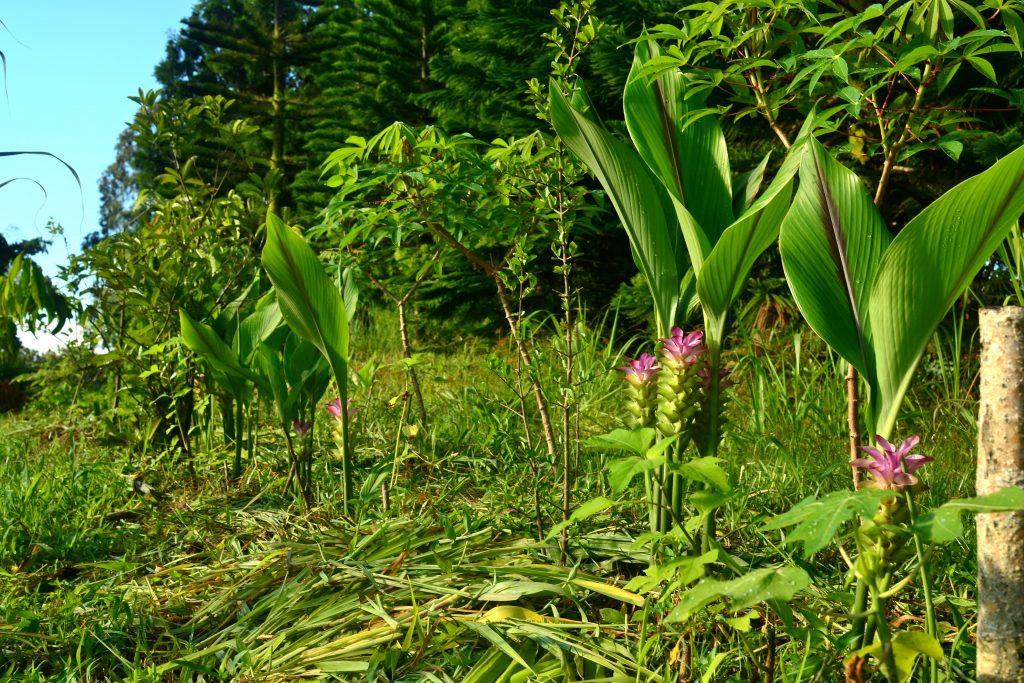
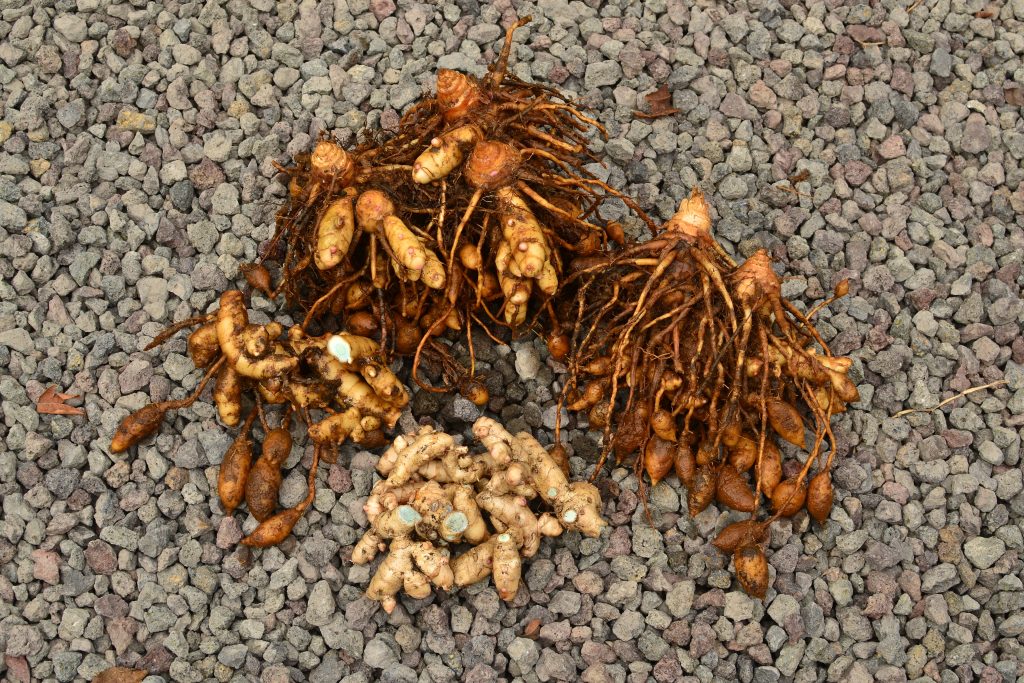
Propagation
Separate roots into rhizomes, mother rhizomes and storage roots. Typically, turmeric is planted only from the mother rhizomes; the regular rhizomes are sold or used. If you only have access to regular rhizomes or are trying to propagate as many plants as you can, growing from the rhizomes is fine. Break them into sections where you have at least three eyes per rhizome. Plant them into the soil three to four inches deep and await their emergence.
Thus far, I have not figured out what to do with the storage roots; they do not grow, and I haven’t experimented with utilizing them. I usually only use the rhizomes.
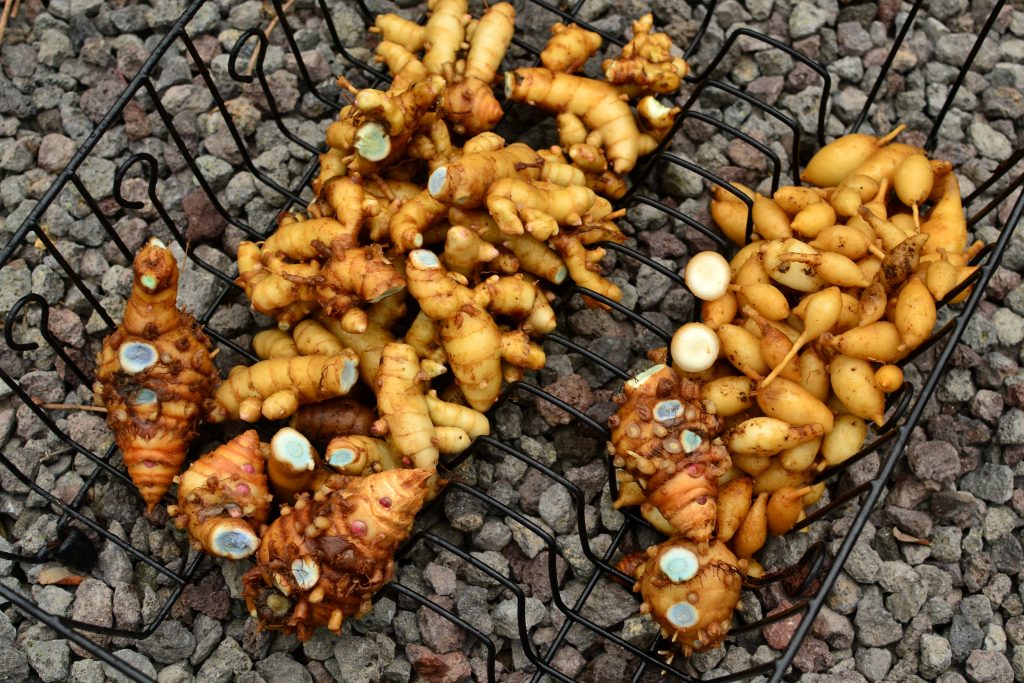
Regular Rhizomes on top left. Mother Rhizomes bottom. Storage Roots top right.
Care
Black turmeric is grown exactly the same as regular turmeric. Take a rhizome and stick it in the ground, await its emergence in the spring and then fertilize. Once it goes dormant in the winter (leaves die back completely), dig it up and enjoy its beauty and taste!
Eating
In my opinion, rhizomes are too intense to use for cooking. We do a simple tincture and take a dropper full every night before bed. I’ve heard of people doing honey infusions as well.
To make the tincture, we take freshly washed rhizomes and add them to a food processor to chop finely. We then soak it in Hawaiian Okolehao (moonshine made from Ti leaf and sugarcane) for three to four weeks, agitating/shaking once a day, then strain and jar the liquid.
Where to obtain planting materials
I’ve seen this plant for sale a few times at plant sales, but it still seems to be oddly rare on the Big Island. I think because of its intensity, many people do not know how to use it.
My Garden
I’ve been growing black turmeric for a few years now; it wasn’t until this past year that I started consuming it on a regular basis. Previously, I only grew it as an ornamental because I couldn’t find a way to utilize the rhizomes appropriately. My mom’s co-worker shared with us her recipe for the tincture in exchange for some rhizomes. This simple exchange gave us the potential to utilize this amazingly medicinal plant. I believe the sugarcane in the moonshine smoothes out the intensity of the turmeric flavor, allowing it to be diluted enough to be enjoyable. We haven’t experimented with other alcohols, yet, but I’m already convinced the moonshine is the way to go.
This plant is highly ornamental and thrives without much attention. Everyone should be growing it!
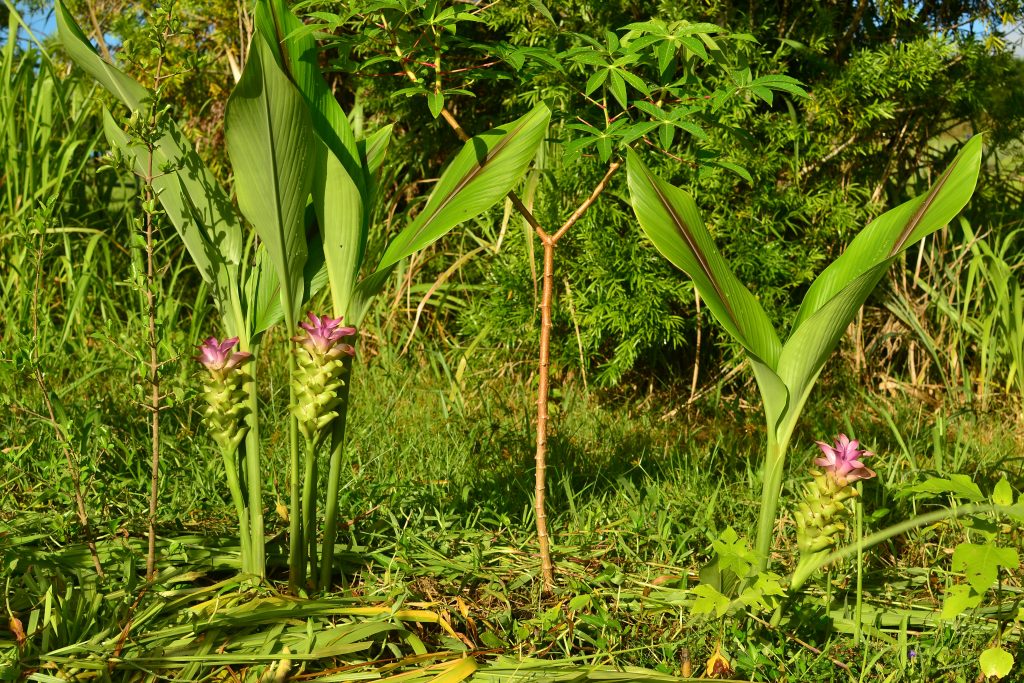
Black Turmeric growing with: Acerola, cassava, mexican sunflower, awapuhi, sugar cane, mocambo, brazilian cherry, rollinia, mulberry, ooray, blackberry jam fruit, Ugni, podocarpus and cook pine.
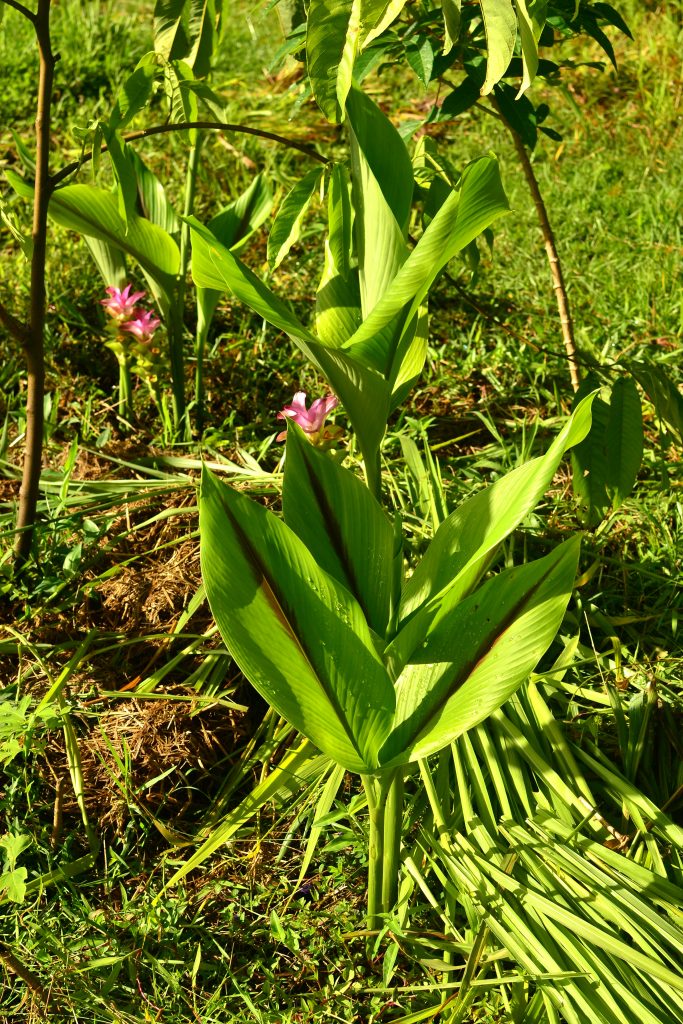
Black Turmeric growing with: Acerola, cassava, mexican sunflower, awapuhi, sugar cane, mocambo, brazilian cherry, rollinia, mulberry, ooray, blackberry jam fruit, Ugni, podocarpus and cook pine.
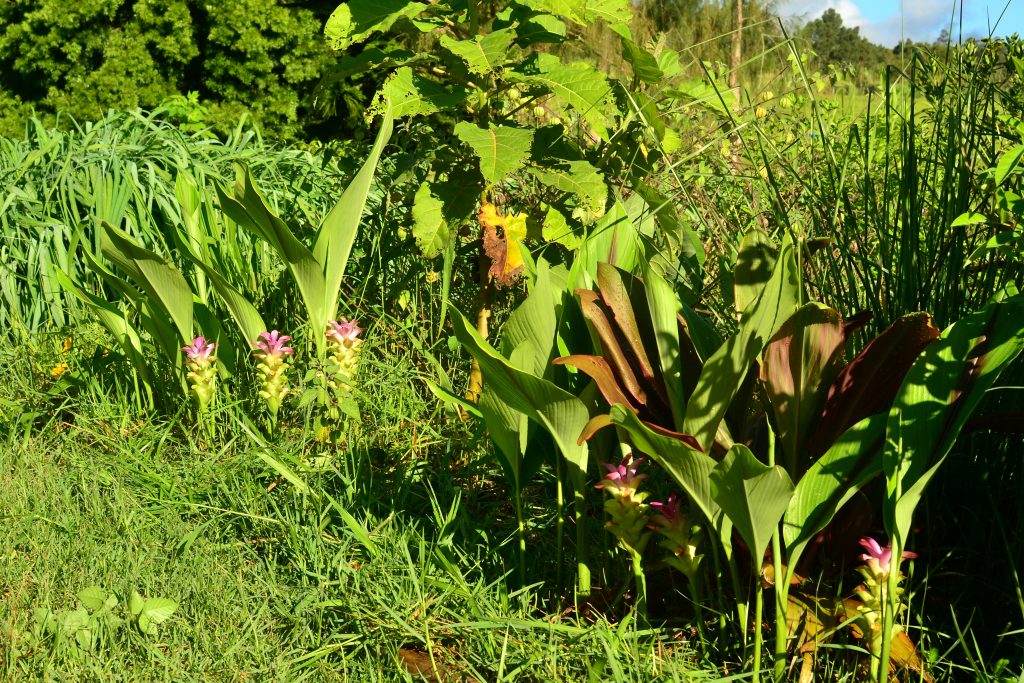
Black Turmeric growing with: ti leaf, vetiver, pigeon pea, belembe, triple crown thornless blackberry, culantro, tamarillo, kumquat, poha, bell peppers, and citronella grass
Happy Gardening!
The plant is grown in a similar manner as common turmeric plant and just like yellow turmeric, black turmeric is available in both fresh and powder form. In some parts of Madhya Pradesh, the rhizomes are considered auspicious. The plant may be used to indicate abundance and the possession of this plant is said to prevent a shortage of food grains and cereals at home. The rhizome has a characteristic sweet smell due to the presence of essential oils. The plant has special significance for tribes in Manipur and some other states, where the paste from the rhizomes is applied on wounds as well as snakes and scorpion bites.
What a beautiful plant!
Can I purchase some to grow?
Please let me know how to proceed.
My number is 808-636-3906
please email me through the contact page and we can sort it out!
We just harvested a lot of the black turmeric, and the storage roots are very abundant. The Caribbean arrowroot (leren) is very similar, with very mild flavor, I’ve dried and made flour from it, and it works as bulking ingredient. I am thinking of trying to do the same with the Curcuma caesia but the flavor is so strong that I am afraid to loose my time…have you done something with them? Thanks
ive found the storage roots do not have quite as strong of a flavor as the rhizomes. they are very starchy and slimy. i tried to make an alcohol extraction with just the storage roots and it came out terrible. i just composted it. so no i havent found a good use for them except as compost.
We are making a pomace for topical use of the starchy potatoes of the plant. I found that it is effective against mosquito bites
I Live in Houston, can you kindly help me to get one plant for my garden.
unfortunately i have no sources on the mainland, and im unable to ship
Hello, right now it is starting to sprout, I can check if there are a couple delayed so they can be shipped
We can ship this root. josannasgarden@yahoo.com
Hello! They are starting to sprout. I can check if it is possible. For further info you can contact me at pmontemar@gmail.com
Can the different turmerics be grown in the same planting bed, close to eachother? Like the black, blue, orange, yellow, etc , or will they change eachother?
Are the black turmeric leaves edible?
i believe all ginger leaves are edible, but i think you want to eat them before the leaves open when it is just a spear